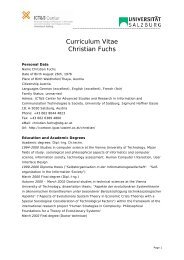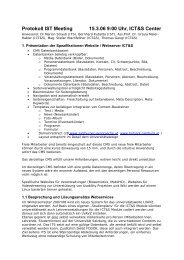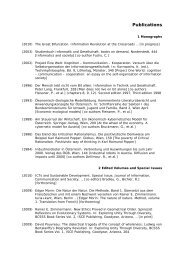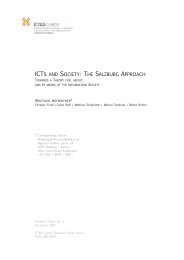CHRISTIAN FUCHS - ICT&S - Universität Salzburg
CHRISTIAN FUCHS - ICT&S - Universität Salzburg
CHRISTIAN FUCHS - ICT&S - Universität Salzburg
You also want an ePaper? Increase the reach of your titles
YUMPU automatically turns print PDFs into web optimized ePapers that Google loves.
Christian Fuchs: Social Networking Sites and the Surveillance Societythat profits can be raised and new media capital may be accumulated. This situation isone of infinite over-exploitation. Capitalist produsage is an extreme form of exploitationthat the produsers perform completely for free.That surplus value generating labour is an emergent property of capitalist productionmeans that production and accumulation will break down if this labour is withdrawn. Itis the essential part of the capitalist production process. That produsers conduct surplusgeneratinglabour, can also be seen by imagining what would happen if they wouldstop using platforms like YouTube, MySpace, and Facebook: The number of users woulddrop, advertisers would stop investments because no objects for their advertisingmessages and therefore no potential customers for their products could be found, theprofits of the new media corporations would drop and they would go bankrupt. If suchactivities were carried out on a large scale, a new economy crisis would arise. Thisthought experiment shows that users are essential for generating profit in the newmedia economy. Furthermore they produce and co-produce parts of the products, andtherefore parts of the use value, exchange value, and surplus value that are objectifiedin these products.Dallas Smythe (1981/2006) argues that in the case of media advertisement models, theaudience is sold as a commodity:“Because audience power is produced, sold, purchased and consumed, itcommands a price and is a commodity. (….) You audience members contributeyour unpaid work time and in exchange you receive the program material and theexplicit advertisements” (Smythe 1981/2006: 233, 238).With the rise of user-generated content and free access social networking platforms andother free access platforms that yield profit by online advertisement, the Web seems tocome close to accumulation strategies employed by the capital on traditional massmedia like TV or radio. The users who google data, upload or watch videos on YouTube,upload or browse personal images on Flickr, or accumulate friends with whom theyexchange content or communicate online via social networking platforms like MySpaceor Facebook, constitute an audience commodity that is sold to advertisers. Thedifference between the audience commodity on traditional mass media and on theInternet is that in the latter the users are also content producers; there is user-generatedcontent, the users engage in permanent creative activity, communication, communitybuilding, and content-production. That the users are more active on the Internet than inthe reception of TV or radio content is due to the decentralized structure of the Internet,which allows many-to-many communication. Due to the permanent activity of therecipients and their status as produsers, I would, in the case of the Internet, argue thatthe audience commodity is a produser commodity. The category of the produsercommodity does not signify a democratization of the media towards participatorysystems, but the total commodification of human creativity. Much of the time spentonline produces profit for large corporations like Google, News Corp. (which ownsMySpace), or Yahoo! (which owns Flickr). Advertisements on the Internet are frequentlypersonalized; this is made possible by surveilling, storing, and assessing user activitieswith the help of computers and databases. This is another difference from TV and radio,which provide less individualized content and advertisements due to their morecentralized structure. But one can also observe a certain shift in the area of traditional31









